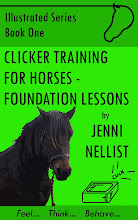As I write this my 16 month old son, Sam is exploring the possibilities of scaling the sofa, and so I'm grateful for the spellchecker as I divide my attention between writing this article and supervising my eager toddler.
Horse mothers have the same job, naturally shared with the band's stallion who is also usually the foal's father. The mother isn't just a food source, but that secure base for the infant horse to explore the world from. The foal feels brave enough to do this because he knows his mother is always there for him, as his protector and comforter. It's perhaps no surprise that after any excitement a foal always goes to his mother to suckle. This isn't just for nourishment but for comfort too. Nursing is associated with the effect of “appeasing pheromones” secreted from between the mares' udders in the early weeks that both facilitate bonding, and have a calmative effect. Suckling will always be associated with these two things as a result, and will balance out life's stresses, restoring the ability to relax.
I hope it's now pretty clear that weaning is a very significant life stage for the horse. Weaning
is not just about the foal becoming nutritionally independent of his
mother, but also becoming independent of her as a secure base. The normal biological adaptation is for mares to wean their foals at approximately 11 months of age. Some wean earlier, others much later, particularly when it's their first foal.
Studies of feral horses show that mares tend to reject their foal's
attempts to nurse, by walking off and behaving aggressively, around a month prior to giving birth to the next foal. This
is because milking and the last stages of pregnancy come at a high
energy cost.
The key thing to note is that it is the foal's attempts to nurse that are rejected, not the foal. Nutritional weaning takes place at this stage, the foal no longer has mum's milk, but
the mare and foal still enjoy other interactions. The foal, who is now a juvenile only becomes completely independent
of mother somewhere between 18 months and 4 years when they are sexually mature and leave voluntarily in search of their own mates. Contrary to popular
belief, young horses are rarely expelled from the herd. Where
there is an unnatural ratio of mares to stallions, such as in UK where horses are kept under free range conditions on common land, youngsters can remain with their mothers for
life, e.g. when a filly is kept on by her owner for breeding purposes.
Artificial weaning, where foals are removed from their mothers anywhere from 4 to 8 months of age, often abruptly, has far bigger significance in terms of negative
effects on horse welfare.
Early
and abrupt weaning not only causes a nutritional stress, but a
significant psychological one too: It is associated with the onset of
crib biting in horses that have the genetic predisposition to do so,
and with gastric ulcers. Early, abruptly weaned horses also tend to
become depressed post weaning, or alternatively, hyper vigilant. Without mum they feel vulnerable and defensive, and so don't sleep as well as they ought.
This can lead to some horses struggling to get used to supposedly normal
events later in life; sharp, reactive behaviour is a possible outcome –
simply because their nervous system became 'sensitised' to stressful stimuli and situations during the
weaning phase and then forever more are over reactive to even the smallest amount of
stress as a result.
Also, it
is not only the foal that can become distressed by acute and early
separation. The mare knows it is her job to keep her baby safe from
harm. When feral foals wander off, away and out of sight, the mares
will call for them until they are reunited, often with the help of their father who is not only a playmate and role model, but also a key figure in keeping the group safe together. He will actively herd the foal back to the group to make sure that safety is preserved. I have seen this on more than one occasion
when studying hill ponies, and it has been documented by other
researchers in other parts of the world. When a mare can't locate her
foal, and knows it has not died, she may become distressed and hyper
vigilant.
So you have a mare and foal, what is the best way for you to wean them? Well, later is better, unless there are clear and significant medical reasons as to why not to. When you have some alternative company for your foal, and for your mare. Ideally these are individuals that are already part of your mare and foal's group, not strangers. That there is at least one responsible adult horse to look after one or more weanlings, to help them feel safer, and to continue their development of good horse etiquette. That you take the time to allow all to adjust to their new circumstances. An Austrian study detailed in TheHorse.com describes how having a "nanny" mare who has been present from birth reduces the stress experienced by foals compared to foals weaned without the presence of a nanny: http://www.thehorse.com/articles/28016/study-nanny-horses-reduce-weaning-stress-for-foals




No comments:
Post a Comment